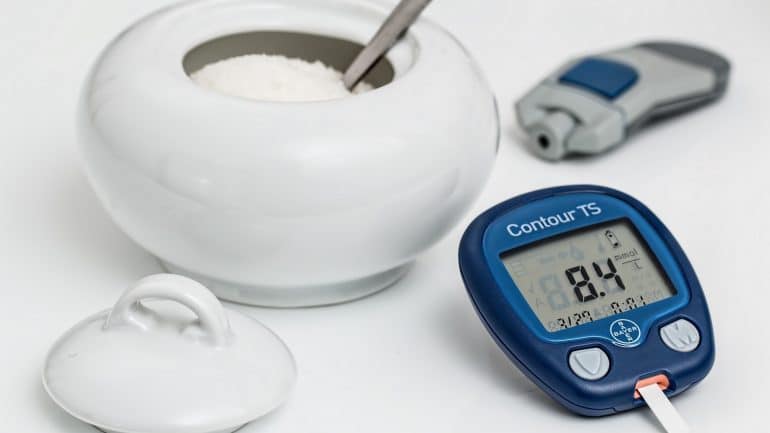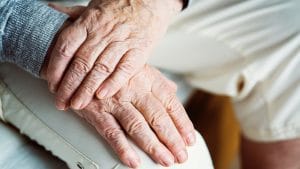Diabetes and Sleep: An Overview of a Complex Relationship
written by / June 22, 2020

There’s a clear connection between diabetes and sleep. Chronic sleep problems, such as insomnia and sleeplessness, are among the neglected but significant risk factors for developing diabetes, types 1 or 2. Many scientists have linked the increasing incidence of diabetes in recent years with the growing number of people who aren’t getting good quality sleep. There’s also an inverse connection: the effects of diabetes can include unpleasant sleep problems.
The Relationship Between Blood Sugar and Sleep Problems
Many physiological changes occur in that body during sleep. These are related to various physical processes associated with blood sugar:
- Cardiovascular system – It induces a decreased heart rate and lower blood pressure during sleep.
- Appetite – The hormone leptin, which acts to suppress appetite, rises significantly during the night.
- Glucose metabolism – Insulin sensitivity decreases in the evening, with glucose tolerance becoming minimal by midnight. During the first half of the night, glucose uptake becomes delayed. This is associated with high blood sugar and a sleepy state.
- Endocrine system – Melatonin and cortisol follow the circadian rhythm. In addition, the growth hormone reaches its peak concentrations in the first hours of sleep, and prolactin increases both at night and during any daytime sleep. Furthermore, thyroid-stimulating hormone levels decline during sleep, which may be related to lower metabolic needs.
- Thermoregulatory system – During sleep, the body’s temperature drops, and energy consumption is reduced.
A sleep disorder and diabetes can be related. Disturbances in the complex mechanisms regulating the circadian rhythm can also provoke endocrine disturbances, such as changes in blood sugar levels, etc.
Since we already know how healthy sleep affects the functions in our body, we can guess what the consequences of sleep disorders will be on our metabolism. A high body mass index (BMI) is a risk factor for the onset of sleep apnea and diabetes, conditions that cause other health complications. Significant weight gain can cause insulin resistance, which in turn can lead to diabetes mellitus and promote additional weight gain. What’s more, the diabetes rate has been increasing in the last few decades.
The evidence shows that sleep deprivation can damage glucose metabolism and increase the risk of type 2 diabetes. In turn, people who have diabetes can also have some sleep problems.
This forms a vicious circle that becomes challenging to break in a busy daily routine—but not impossible.
How Do Sleep and Diabetes Influence Each Other?
In the long run, short and defective sleep has been found to increase the risk of severe health problems, including obesity and type 2 diabetes. Various studies show that sleep duration can affect blood sugar levels, appetite-controlling hormones, and even the brain’s perception of high-calorie foods. Scientists have come up with a number of explanations for the increased mutual risk of developing type 2 diabetes and sleep disturbances.
Poor sleep impairs the ability of fat cells to respond to insulin, a new study suggests. After four nights of sleep deprivation, the results of blood tests show that participants’ insulin sensitivity is about 16%, lower on average compared to periods of complete sleep. The combination of problems with sleep and diabetes type 2 was once again emphasized in the following result. The insulin sensitivity of fat cells was reduced by 30%, reaching levels typically found in overweight or diabetic people.
In simple words, fat cells need sleep. And if they don’t get enough of it, they become vulnerable. When sleep-deprived, fat cells need three times more insulin to activate the enzyme Akt, which plays a crucial role in regulating blood sugar. This explains a similar pathway related to type 1 diabetes and sleep deprivation. Regarding diabetes type 2, as insulin resistance increases, the accumulation of excess sugar and cholesterol in the blood increases the risk of diabetes and heart disease.
Researchers still don’t know how fat cells recognize and record sleep deprivation, but there are ways diabetes and sleepiness can go together. According to one theory, the lack of sleep causes a stress response in the body related to insulin resistance—which leads to the release of the stress hormones cortisol and norepinephrine.
However, insulin resistance depends also on other factors such as metabolic syndrome, weight, pregnancy, infections, disease, stress, medication, steroid use, etc.
Can Blood Sugar Levels Affect Sleep?
Despite adhering to good health recommendations, many young people with type 1 diabetes have difficulty keeping their blood sugar under control. The cause of this may be sleep disorders like sleep apnea, according to a new study.
Compared to the control group, it was found that people with diabetes spend a greater portion of their sleep in the lighter phase of sleep. This leads to higher glucose levels, behavioral problems, a decreased quality of life, depression, poor quality of sleep, drowsiness, and trouble retaining information. The results showed that type 1 diabetes and sleep disorders are mutually linked.
Furthermore, a short duration of sleep or chronic sleep deprivation in patients with type 1 diabetes diminishes their insulin sensitivity. In line with this, it only follows that dealing with sleep problems will improve the physical and mental health of diabetics, which the experts confirm.
There is also a phenomenon called low blood sugar insomnia or insomnia caused by nocturnal hypoglycemia. A drop in blood glucose level leads to the secretion of hormones that aim to regulate glucose levels. The overall result of this is a disruption in sleep and reduced sleep quality. Eating two hours before sleep can prevent this condition because it helps the body stabilize its blood glucose levels.
But is insomnia a symptom of diabetes? It’s been shown that most people with diabetes complain of insomnia. On the one hand, diabetes symptoms can disrupt normal sleep at night. On the other hand, lack of sleep increases the risk of developing diabetes, or it can worsen the condition.
Furthermore, a direct link between insufficient sleep and the onset of a pre-diabetic condition known as impaired fasting glycemia was established. It’s estimated that a night’s sleep that usually lasts fewer than six hours increases the risk of developing a pre-diabetes condition by three times.
How Many Hours Should a Diabetic Sleep?
Several studies have been conducted to investigate the relationship between prolonged sleep (which is defined differently in different studies) and health concerns like obesity, cardiovascular problems, and even mortality. Sleeping too long can also be a sign of certain mental disorders. But why does too much sleep cause such trouble? There are several possible explanations.
When we’re talking about too much sleep and diabetes, know that oversleeping can raise blood sugar levels in your body. In addition, there’s a claim that people who don’t get enough sleep are at risk for obesity. The opposite is also true since a person who spends too much time in bed has less time to be active.
Moreover, getting more than 8–9 hours of sleep at night increases the risk of cardiovascular diseases by 34%—in addition to risking obesity and glucose disturbances.
Regarding diabetes and sleep problems, many people may find six hours of sleep to be satisfactory, but scientific studies show that in terms of diabetes prevention, it really isn’t sufficient. Prolonging sleep so that it lasts at least seven hours a night can be considered a sure way to decrease the risk of developing diabetes.
Can Diabetes Cause Sleep Problems?
The link between sleep problems and diabetes is explained by many factors, such as the negative impact of insomnia on the regulation of blood sugar levels. Although these processes are based on purely hormonal changes, prolonged sleep problems trigger them.
On the one hand, there’s a clear relationship between insomnia and diabetes. Insomnia slows insulin secretion and impairs the absorption of blood glucose from the body’s cells. On the other hand, prolonged sleep deprivation leads to increased anxiety and mental stress. Under these conditions, secretion of the stress hormone cortisol is increased. High levels of cortisol inhibit insulin action. Thus, chronic insomnia not only decreases insulin secretion, it also suppresses its effect.
All these show the particularly high risk of a persistent increase in blood sugar in the case of chronic lack of sleep, and diabetes can even develop. Besides, increased anxiety and high levels of cortisol in people who have chronic sleep problems further complicate sleep because they delay the synthesis of melatonin, the sleep hormone. Thus, regular sleeplessness and insomnia unleash a vicious cycle that further increases the risk of diabetes.
A sleep deprivation and diabetes co-occurrence is also connected regarding insulin secretion. It was shown that the so-called stage of deep sleep has the most positive impact on insulin secretion. Since sleep goes through four or five 100-minute sleep cycles, sleeping less than six hours a day means that the risk of diabetes may increase due to insufficient deep sleep.
What Is the Sleep Apnea and Diabetes Connection?
Do you snore? Do you feel exhausted during the day? Do you often wake up at night? If the answers are “yes,” you should probably seek medical advice. Irregular and intermittent breathing or even the cessation of breathing at night could be sleep apnea symptoms. How can obstructive sleep apnea make controlling type 2 diabetes even more difficult?
When diabetes and sleep apnea go together this way, it’s of paramount importance to address the complications caused by sleep apnea. According to a 2016 study, approximately 80% of people with sleep apnea are undiagnosed and have no idea they are suffering from this severe illness. And this disease could even have fatal consequences.
If you’re trying to control your diabetes, sleep problems like sleep apnea can make managing endocrine disturbances even more difficult. This is because when you stop breathing while you sleep, the carbon dioxide in your blood increases. And this, in turn, leads to the following:
- Insulin resistance, inefficient use of insulin in the body, and elevated blood sugar levels
- Chronic high blood pressure
- An increased incidence of heart problems and cardiovascular diseases
- A headache the next day
The relationship between diabetes and lack of sleep is also demonstrated in the way that an inadequate night’s sleep sometimes results in a less active lifestyle and poor nutrition. This often leads to irritability, which can also affect our relationships with loved ones, friends, and colleagues. Drowsiness can also make us forget to take our medication—and accordingly bring about additional complications for patients with diabetes.
Type 1 and Type 2 Diabetes and Sleep Apnea Management
Although sleep apnea may be genetically inherited, it’s most commonly found in overweight or obese people, smokers, and people over 40. Obstructive sleep apnea is a type of apnea in which airflow to the lungs is physically blocked during sleep. Snoring is a common symptom in obstructive sleep apnea, and it’s a prevalent condition for people with type 2 diabetes. In this way, the combination of sleep apnea and type 2 diabetes is common.
Furthermore, studies show that a deterioration in the clinical course of obstructive sleep apnea is linked to poor glucose control. See your doctor for a sleep test to find out if you suffer from sleep apnea or not because a combination of diabetes and the following symptoms can be problematic:
- Daytime sleepiness or tiredness
- Depression
- Irritability
- Sexual dysfunction
- Snoring
If you have diabetes, the most important thing is to find out if you suffer from sleep apnea at the same time. Specifically in the case of daytime sleepiness, this symptom of diabetes could specifically be a sign of sleep apnea.
Once diagnosed, often via a sleep test called polysomnography, sleep apnea is treated with continuous positive airway pressure (CPAP) devices. The pressure generated by the apparatus supplies air through a nasal mask, which prevents the throat from closing during sleep, thus preventing sleep apnea.
Managing your sleep will help you to keep your diabetes under control. What’s more, you’ll feel much better during the day when you wake up well-rested.
Diabetes, Insomnia, and Pregnancy
Gestational diabetes is a specific condition that occurs during pregnancy. It’s characterized by high blood sugar and is most commonly found in the second half of pregnancy in women who have not had similar problems before becoming pregnant.
The risk of gestational diabetes increases over the course of pregnancy—and this risk is increased based on the standard causes of diabetes. These primarily include an inherited predisposition to diabetes and an unhealthy lifestyle. A recent study shows that the usual lack of sleep symptoms can contribute to the development of gestational diabetes.
Diabetes and sleep deprivation are connected in the following way. According to scientists, pregnant women—whose sleep is regularly shorter than six hours—face a two-fold higher risk of gestational diabetes than women who sleep at least eight hours a day.
Ensuring you get a good quality and quantity of sleep during pregnancy has a very positive effect on blood glucose levels. Prolonged sleep balances the body’s hormonal levels, including that of insulin. On the other hand, when there are changes in one’s blood sugar, insomnia can also be common.
It’s been established that the average person’s sleep time is decreasing, and pregnant women are no exception. Thus, the risk of insulin resistance and its associated hyperglycemia increases. So far, the correlation between poor sleep, rising blood sugar, and the development of diabetes has been confirmed in different age groups, as well as in pregnant women.
Gestational Diabetes and Sleep
Studies show different changes in sleep patterns across trimesters, each change being related to the risk of gestational diabetes. During the first three months of pregnancy, it’s highly common to experience increased drowsiness and a slightly longer sleep duration. This effect is associated with elevated levels of the hormone progesterone in the first trimester.
During the second trimester, organogenesis and rapid growth in fetal size lead to increased urination at night and more frequent nocturnal wake-ups. The overall effect on sleep is already negative. In the case of gestational diabetes, diabetic sleeping problems are even more complicated.
The most noticeable problems are sleep disturbances in the third trimester when it’s difficult to fall asleep and maintain sleep. This is due to both hormonal and physical changes in the woman’s body. All these changes weaken the ability of the female body to control blood sugar levels. Studies show that, as a result, they can decrease blood glucose tolerance and increase insulin resistance.
Since pregnant women need more sleep, how much sleep do they need? The data show at least eight hours of sleep as a leading goal during pregnancy, equally crucial for the health of both the mother and the fetus.
Diabetes and Sleep Aids
Although there aren’t any recommended sleep aids to specifically treat sleeping problems in people with diabetes, melatonin can be used.
Melatonin—a hormone produced by the brain known for its role in helping the sleep process—may also help reduce the risk of type 2 diabetes. While melatonin regulates the sleep-wake cycle, it also plays a role in other vital functions in the body, including glucose metabolism. According to experts, low levels of melatonin during sleep increase the risk of developing diabetes.
Furthermore, a study tracking the relationship between melatonin levels, sleep, and type 2 diabetes found that people with diabetes had reduced levels of melatonin overnight. Low levels of melatonin affect the ability of the pancreas to secrete insulin, as well as the body’s sensitivity to insulin, leading to the development of type 2 diabetes. Other contributing and prerequisite factors for developing diabetes were lack of sleep, poor quality of sleep, sleep apnea, irregular sleep-wake cycles, and shift work.
Other trials investigated diabetes and sleeping tablets. A randomized, double-blind study from 2011 on the efficacy and safety of prolonged-release melatonin in insomnia patients with diabetes showed improved glycemic control alongside sleep quality compared to a placebo.
Antihistamines and sedative-hypnotic sleep pills can also be prescribed in people with diabetes for sleep problems. However, this should be the last resort—and always start with the lowest dose. Observing good sleep hygiene and keeping a soothing environment will also help diabetes patients manage their sleep problems.
FAQs
Can high blood sugar wake you up аt night?
High blood sugar at night can provoke you to urinate more frequently at night or to wake up with feelings of thirstiness. This will result in a disrupted sleep pattern and sleep deprivation. It can also be one of the first symptoms of diabetes. Other less common signs of high blood glucose are feelings of warmness, irritability, and unsettledness at night.
What is the best thing for a diabetic to eat before bed?
It’s a good idea for a person with diabetes to eat a bedtime snack. Consuming a high-fiber, low-fat snack before bed can help to maintain blood glucose for the entire night. Excellent snack ideas include whole-wheat crackers with cheese, chia pudding, hard-boiled eggs, an apple with peanut butter, or yogurt with berries. If you wonder what not to eat, here is a list, prepared by us.
Do diabetics get tired easily?
Chronic maintenance of high blood sugar levels (hyperglycemia) and other diabetes symptoms can lead to many other unpleasant complaints, such as fatigue. Low blood sugar (hypoglycemia) can also cause fatigue, especially when blood sugar levels drop sharply or after treatment. It’s characterized by the inability to feel better after resting. However, lifestyle changes can alleviate fatigue associated with diabetes.
Conclusion
Diabetes is a condition that affects many organs, systems, and processes in the body, including sleep. Diabetes and sleep are also inversely linked because sleep disorders themselves can lead to an increased risk of developing diabetes. Once detected, the problem can be improved with one or more lifestyle changes, better diabetes management, and the treatment of any underlying sleep disorders. However, it’s essential to be consistent in following new habits every day.
Table of Contents
The Relationship Between Blood Sugar and Sleep Problems
How Do Sleep and Diabetes Influence Each Other?
Can Blood Sugar Levels Affect Sleep?
How Many Hours Should a Diabetic Sleep?
Can Diabetes Cause Sleep Problems?
What Is the Sleep Apnea and Diabetes Connection?
Type 1 and Type 2 Diabetes and Sleep Apnea Management
Diabetes, Insomnia, and Pregnancy
Gestational Diabetes and Sleep
Diabetes and Sleep Aids
FAQs
Conclusion
Table of Contents
The Relationship Between Blood Sugar and Sleep Problems
How Do Sleep and Diabetes Influence Each Other?
Can Blood Sugar Levels Affect Sleep?
How Many Hours Should a Diabetic Sleep?
Can Diabetes Cause Sleep Problems?
What Is the Sleep Apnea and Diabetes Connection?
Type 1 and Type 2 Diabetes and Sleep Apnea Management
Diabetes, Insomnia, and Pregnancy
Gestational Diabetes and Sleep
Diabetes and Sleep Aids
FAQs
Conclusion









Warning: Undefined array key "format" in /home/602518.cloudwaysapps.com/cspedpjass/public_html/wp-content/themes/disturbmenot/template-parts/post-item/post-comment.php on line 23
Warning: Undefined variable $commenter in /home/602518.cloudwaysapps.com/cspedpjass/public_html/wp-content/themes/disturbmenot/template-parts/post-item/post-comment.php on line 27
Warning: Trying to access array offset on value of type null in /home/602518.cloudwaysapps.com/cspedpjass/public_html/wp-content/themes/disturbmenot/template-parts/post-item/post-comment.php on line 27
Warning: Undefined variable $commenter in /home/602518.cloudwaysapps.com/cspedpjass/public_html/wp-content/themes/disturbmenot/template-parts/post-item/post-comment.php on line 29
Warning: Trying to access array offset on value of type null in /home/602518.cloudwaysapps.com/cspedpjass/public_html/wp-content/themes/disturbmenot/template-parts/post-item/post-comment.php on line 29